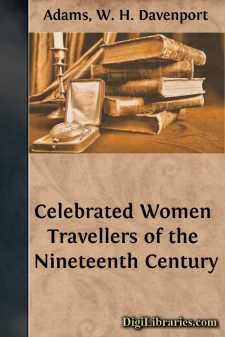Categories
- Antiques & Collectibles 13
- Architecture 36
- Art 48
- Bibles 22
- Biography & Autobiography 813
- Body, Mind & Spirit 142
- Business & Economics 28
- Children's Books 15
- Children's Fiction 12
- Computers 4
- Cooking 94
- Crafts & Hobbies 4
- Drama 346
- Education 46
- Family & Relationships 57
- Fiction 11828
- Games 19
- Gardening 17
- Health & Fitness 34
- History 1377
- House & Home 1
- Humor 147
- Juvenile Fiction 1873
- Juvenile Nonfiction 202
- Language Arts & Disciplines 88
- Law 16
- Literary Collections 686
- Literary Criticism 179
- Mathematics 13
- Medical 41
- Music 40
- Nature 179
- Non-Classifiable 1768
- Performing Arts 7
- Periodicals 1453
- Philosophy 64
- Photography 2
- Poetry 896
- Political Science 203
- Psychology 42
- Reference 154
- Religion 513
- Science 126
- Self-Help 84
- Social Science 81
- Sports & Recreation 34
- Study Aids 3
- Technology & Engineering 59
- Transportation 23
- Travel 463
- True Crime 29
Celebrated Women Travellers of the Nineteenth Century
Description:
Excerpt
COUNTESS DORA D'ISTRIA.
The Princess Helena Koltzoff-Massalsky, better known by her pseudonym of Dora d'Istria, came of the family of the Ghikas, formerly princes of Wallachia, and was born at Bucharest, on the 22nd of January, 1829. Through the care and conscientiousness of her instructor, Mons. Papadopoulos, and her own remarkable capacity, she acquired a very complete and comprehensive education. When but eleven years old, she composed a charming little story, and before she had reached womanhood, undertook a translation of the Iliad. She showed no inclination for the frivolous amusements of a frivolous society. Her view of life and its responsibilities was a serious one, and she addressed all her energies to the work of self-improvement and self-culture. She read and re-read the literary masterpieces of England, France and Germany. As a linguist she earned special distinction.
"Her intellectual faculties," says her master, M. Papadopoulos, "expanded with so much rapidity, that the professors charged with her instruction could not keep any other pupil abreast of her in the same studies. Not only did she make a wholly unexpected and unhoped-for progress, but it became necessary for her teachers to employ with her a particular method: her genius could not submit to the restraint of ordinary rules."
She was still in the springtime and flush of youth, when she went on a tour to Germany, and visited several German courts, where she excited the same sentiments of admiration as in her own country; it was impossible to see her without being attracted by so much intellect, grace and amiability. Travelling enlarged her horizon: she was able to survey, as from a watch-tower, the course of great political events, and she found herself mixing continually with the most celebrated savants and statesmen of the age. Her friendly relations with persons of very diverse opinions, while enabling her to compare and contrast a great variety of theories, did but strengthen in her "the idea and sentiment of liberty, which can alone conduct society to its true aim." Finally, from the Italian revolution of 1848, which awoke her warmest sympathies, she learned to understand the fatal consequences of despotic government, as well as the inevitable mistakes of freedom, when first unfettered and allowed to walk alone.
At the age of twenty she was married (February, 1849), and soon afterwards she set out for St. Petersburg, where she was recognised as the ornament of the higher society. In the midst of her numerous engagements, in the midst of the homage rendered to her wit and grace, she found time to collect a mass of valuable notes on the condition and inner life of the great Russian Empire, several provinces of which she knew from personal observation. From St. Petersburg to Moscow, from Odessa to Revel, her untiring activity carried her. Most social questions are at work under an apparent calm, and offer, therefore, subjects well worthy of careful study, especially to so grave and clear an intellect as that of Princess Dora d'Istria, who possessed, in the highest degree, the faculty of steady meditation amidst the movement and the world-stir that surrounded her....


